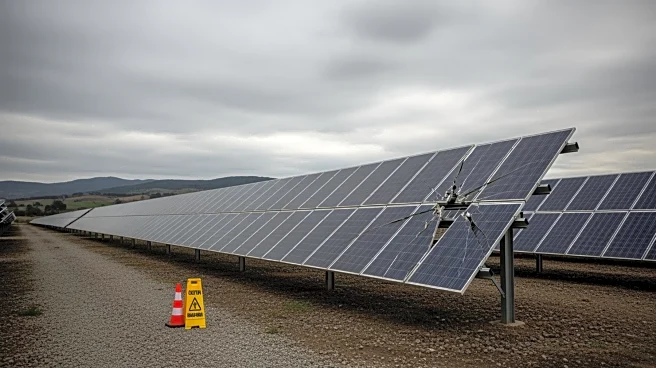What's Happening?
A Chinese-backed solar power project in Bosnia-Herzegovina has faced significant legal challenges following the death of a construction worker at the site. The incident led to an inspection that revealed 71 illegal Chinese workers, resulting in their
deportation and the halting of the $116 million project. Investigations have been launched into potential misuse of public land. This marks a rare setback for Chinese investments in the Balkans, where such projects are often protected by political alliances. Local communities have raised concerns about environmental risks and labor law violations associated with these projects.
Why It's Important?
The legal challenges faced by the Chinese solar project in Bosnia highlight the growing resistance to foreign investments that may compromise environmental and labor standards. This development could influence future foreign investments in the region, prompting stricter enforcement of local laws. It underscores the tension between economic development and environmental protection, with local communities increasingly demanding accountability from foreign investors. The situation may lead to a reevaluation of how such projects are managed and regulated, potentially affecting China's economic strategy in the Balkans.
What's Next?
Local activists in Bosnia are preparing additional legal actions against similar projects, aiming to ensure lawful management of public land and adherence to environmental standards. The outcome of these legal battles could set a precedent for future foreign investments in the region. Chinese companies may need to adjust their strategies to comply with stricter regulations and community expectations. The situation could also prompt regional governments to reassess their policies on foreign investments, balancing economic benefits with environmental and social responsibilities.
Beyond the Headlines
The resistance to Chinese projects in the Balkans reflects broader concerns about the influence of foreign investments on local governance and environmental policies. It raises questions about the role of local governments in protecting public interests and the potential for corruption when foreign capital is involved. The situation may lead to increased scrutiny of foreign investments and a push for greater transparency and accountability. It also highlights the importance of community engagement in decision-making processes related to large-scale infrastructure projects.















